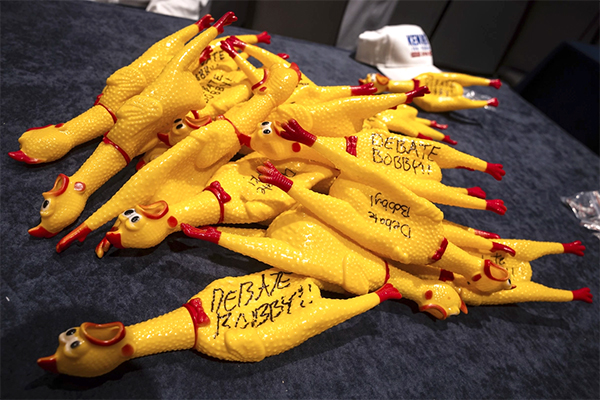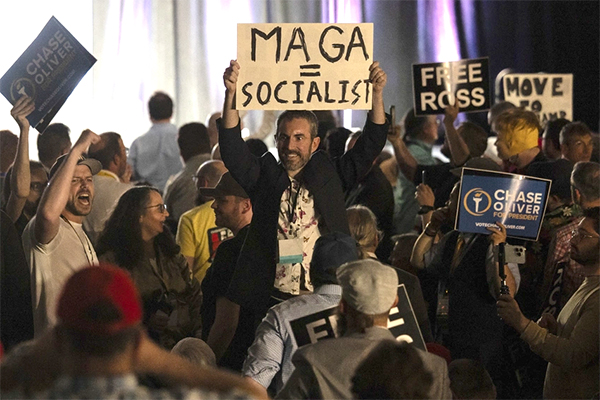

The Libertarian Party held its convention this past weekend in D.C. Party officials invited both Robert Kennedy Jr. and Donald Trump to speak to the attendees. It didn't go well for the former president.
Kennedy went first, on Friday afternoon. He handed out rubber chickens that make noise for attendees to use in order to drown out Trump, who spoke on Saturday. Here is what they looked like:

Kennedy attacked Trump for caving to the bureaucrats during the COVID-19 pandemic. Kennedy is against vaccination and is certainly against vaccine mandates. In principle, this was a good topic to address, since many libertarians agree with him that government mandates are bad. Libertarians are not necessarily against vaccinations themselves (as Kennedy is), they just think it should be an individual choice, not a government requirement. Most of his speech did not address the issues. Instead, he just attacked Trump over and over. He was mostly cheered for that. Kennedy's biggest applause came when he attacked Trump for not pardoning Julian Assange. Kennedy said that Assange is a hero for leaking government secrets. Kennedy barely mentioned Joe Biden at all, even though he is also running for president, as we understand it.
Now on to Saturday. It is probably no secret to most of our readers that Donald Trump is not tethered to reality. He proved it again on Saturday, when he spoke to the convention. Trump is not a Libertarian or even a libertarian or even a libertarian-lite. Libertarians believe in the smallest possible government. For example, health care (especially reproductive health care)? None of the government's damn business. Trade? Leave that to the private sector. Civil liberties (also for LGBTQ+ people)? All people have basic rights, no exceptions allowed, even if your Bible doesn't approve. Drugs? If you want to use drugs in your own home, that's your decision. Prostitution? That's a private transaction between the customer and the service provider and should be completely legal. Immigration? Immigrants improve the country. Trump ought to have known he was not going to be a big hit. He didn't and found out the hard way.
There was sustained booing and jeering almost from the time Trump stepped up to the mic. The attendees didn't even have to listen to Trump to know that he favors using the power of big government to force people to do what he wants them to do. So what did Trump do? He began mocking the LP for its poor electoral record. He also began goading them, telling them they would ultimately end up voting for him, anyhow. We had supposed that he was there to convince individual libertarians that he was with them on at least some issues (like low taxes), but mocking the party and the attendees is an odd way to do it. And telling people "I know you're going to do [X]" is a pretty good way to get them not to do [X], just out of spite. As Trump continued to speak, the audience continued to heckle him. They called him a "panderer," a "liar," and more. The DNC would probably have treated him better.
The fellow who ultimately got the LP nomination, Chase Oliver, said: "If he thinks he is going to win our nomination, he's more delusional than I thought." Trump tried to appease the crowd by dangling a cabinet position for a Libertarian. It didn't work. The crowd kept booing him. This photo gives an idea of where the crowd stood:

One thing Trump said that pleased the crowd is his promise to commute the sentence of Ross Ulbricht, who was convicted and imprisoned for running a website, Silk Road, that allowed people to buy and sell drugs and other illegal products anonymously, paying for them with bitcoins. Other than that, it was a total disaster for Trump. After 34 minutes, he left the stage, one of his shortest speeches ever.
So why did Trump even show up? We suspect that he is worried that third-party candidates may drain a few thousand votes from him in some of the swing states, and that could be the difference between winning the state and losing the state. But he completely botched it. He could have checked out the LP platform, found a few things he agrees with (e.g., parental rights, charter schools, America First in foreign affairs) and talked entirely about how he supports these things. Kennedy may have done himself a bit of good but Trump only alienated most of the attendees.
Eventually, the convention got down to business. The real purpose of a national convention, after all, is to select a presidential nominee. Even though getting the LP nomination is not a path to being elected president, it was a contentious fight. The LP is divided internally between a somewhat left-leaning caucus (the Classic Liberal Caucus) and a somewhat right-leaning caucus (the Mises Caucus). Each had a candidate, but there were multiple other candidates. There were seven rounds of voting. In the first round, RFK Jr. got 2% of the vote and Donald Trump got six votes (0.65%), eliminating them both. Eventually it came down to the Classic Liberal candidate, Chase Oliver, vs. the Mises candidate, Michael Rectenwald. Oliver is an openly gay man most famous for running for the Senate in Georgia in 2022 against Herschel Walker and Raphael Warnock. He got 2% and forced a runoff. His slogan is "Gay and Armed." Rectenwald used to be a professor at NYU who invited right-wing bigot Milo Yiannopoulos to speak on campus. He is no longer a professor there.
In the head-to-head race, as we note above, Oliver triumphed. In his victory speech he talked about the two major parties, saying the lesser of two evils is still evil. "Chase Oliver" sounds more like a white-shoe law firm than a person, but in any case, he's not a retooled former governor or a celebrity, so he has no base beyond his party, and figures to get the same 1% of the vote that nondescript Libertarian Party presidential nominees usually get. In case you are wondering, LP nominee Jo Jorgensen got 1.18% in 2020. (V)